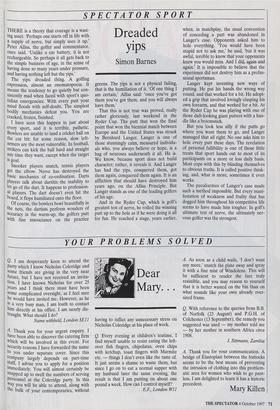SPECTATOR SPORT
Dreaded yips
Simon Barnes
THERE is a theory that courage is a wast- ing asset. Perhaps one starts off in life with a supply of nerve, but simply uses it up,' Peter Alliss, the golfer and commentator, once said. 'Unlike a car battery, it is not rechargeable. So perhaps it all gets back to the simple business of age, in the sense of having done so many years under pressure, and having nothing left but the yips.' The yips: dreaded thing. A golfing expression, almost an onomatopoeia. It means the tendency to go quietly but con- sistently mad when faced with sport's quo- tidian emergencies. With every putt your mind floods with self-doubt. The simplest bodily mechanics defeat you. You are cracked, frozen, finished.
I have seen this happen in just about every sport, and it is terrible, pathetic. Bowlers are unable to land a cricket ball on the cut bit; for some reason, slow left- armers are the most vulnerable. In football, strikers can kick the ball hard and straight ally time they want, except when the target ls goal.
Snooker players snatch, tennis players get the elbow. Nerve has destroyed the basic mechanics of co-ordination. Darts Players talk about dartitis: the inability to let go of the dart. It happens to profession- al players. The dart doesn't even hit the board, it flops humiliated onto the floor. Of course, the bowlers bowl beautifully in the nets, the dartists perform wonders of accuracy in the warm-up, the golfers putt With fine insouciance on the practice greens. The yips is not a physical failing, that is the humiliation of it. 'Of one thing I am certain,' Alliss said: 'once you've got them you've got them, and you will always have them.'
That this is not true was proved, really rather gloriously, last weekend in the Ryder Cup. The putt that won the final point that won the biennial match between Europe and the United States was struck by Bernhard Langer. Langer is one of those stunningly calm, measured individu- als who, you always believe or hope, is a bag of neuroses underneath it all. He is. We know, because sport does not build character; rather, it reveals it. And Langer has had the yips, conquered them, got them again, conquered them again. It is an affliction that should have destroyed him years ago, on the Alliss Principle. But Langer stands as one of the leading golfers of his age.
And in the Ryder Cup, which is golfs greatest test of nerve, he rolled the winning putt up to the hole as if he were doing it all for fun. He reached a stage, years earlier, when, in matchplay, the usual convention of conceding a putt was abandoned in Langer's case. Opponents asked him to hole everything. 'You would have been stupid not to ask me,' he said, 'but it was awful, terrible to know that your opponents knew you would miss. And I did, again and again.' It is impossible to believe that the experience did not destroy him as a profes- sional sportsman.
Langer kept inventing new ways of putting. He put his hands the wrong way round, and that worked for a bit. He adopt- ed a grip that involved lovingly clasping his own forearm, and that worked for a bit. At the Ryder Cup he was playing with one of those daft-looking giant putters with a han- dle like a broomstick.
But you look less silly if the putts go where you want them to go, and Langer managed that all right. No one asks him to hole every putt these days. The revelation of personal fallibility is one of those little treats that sport hands out to most of its participants on a more or less daily basis. Most cope with this by blinding themselves to obvious truths. It is called positive think- ing, and, what is more, sometimes it even works.
The peculiarities of Langer's case made such a method impossible. But every mani- festation of weakness and frailty that has dogged him throughout his competitive life seems to have made him tougher. In golfs ultimate test of nerve, the ultimately ner- vous golfer was the strongest.










































































 Previous page
Previous page